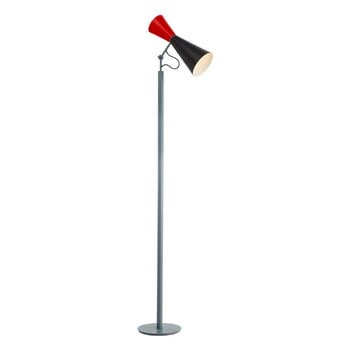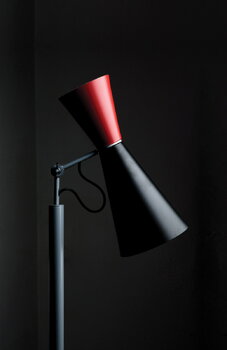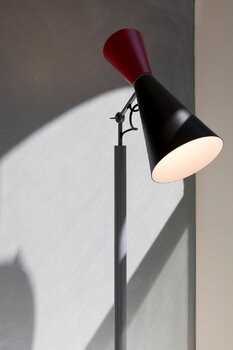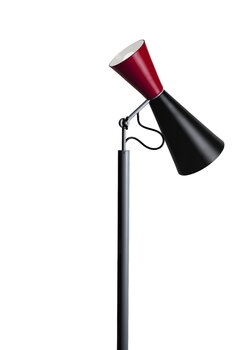Nemo Lighting’s Parliament is a sculptural floor lamp designed by Le Corbusier, originally created for the Palace of Assembly parliament building the world-famous architect designed in Chandigarh, India. The luminaire is made of painted aluminium and has an adjustable shade that casts the light in two directions – the floor lamp is ideal both as a reading light and for creating mood lighting. The stand of the lamp is matt grey, but its duotone shade is available in a variety of colour combinations.
Parliament floor lamp, black - red
Nemo Lighting
Description
Nemo Lighting’s Parliament is a sculptural floor lamp designed by Le Corbusier, originally created for the Palace of Assembly parliament building the world-famous architect designed in Chandigarh, India. The luminaire is made of painted aluminium and has an adjustable shade that casts the light in two directions – the floor lamp is ideal both as a reading light and for creating mood lighting. The stand of the lamp is matt grey, but its duotone shade is available in a variety of colour combinations.
Product details (17)
- Material
- Aluminium, steel
- Colour
- Black, red, grey
- Width
- 26 cm
- Shade diameter
- 12–16 cm
- Base diameter
- 26 cm
- Height
- 170–180 cm
- Bulb base
- E27
- Light source
- 2 x Dimmable max 9W LED (not included)
- IP rating
- 20
- Protection class
- II
- Voltage
- 230 V
- Nominal frequency
- 50–60 Hz
- Certifications and labels
- CE, EAC
- Plug
- EU plug
- Dimmable
- Yes
- Cable length
- 2.7 m
- Weight
- 9.5 kg
- Product ID
Designer
Charles-Édouard Jeanneret-Gris (1887-1965) was a Swiss architect, artist, designer, urban planner and writer, best known for his achievements in modern architecture. He adopted the name Le Corbusier, a pseudonym of his grandmother’s last name Lecorbésier, in 1920 in the first issue of the L’Esprit Nouveau journal.
Le Corbusier started his studies at the La Chaux-de-Fonds art school at the age of thirteen and soon shifted from watchmaking to painting and architecture. He designed his first house in 1905, made several study trips to Europe and worked for a number of architects such as Auguste Perret and Peter Behrens. During World War I Le Corbusier taught in his alma mater and moved later to Paris.
His most important architectural pieces include Villa Savoye in Poissy (1929-1931), Unité d’Habitation in Marseille (1947-1952), the city of Chandigarh in India (1954) and Notre Dame du Haut in Ronchamp (1955). In furniture design Le Corbusier’s LC4 chaise longue and LC2 armchair and sofa are true icons.
Would you like to read more about Le Corbusier and his work? Discover our books:
Le Corbusier, Le Corbusier Le Grand, Guido Guidi: Le Corbusier, 5 Architectures, The Design Book, Atlas of Mid-Century Modern Houses
Reviews (1)
5
Based on 1 reviews
-
P
Pia L
Turku, Finland
345 days ago
Sustainability
This product does not yet have a sustainability rating.
Learn more.












